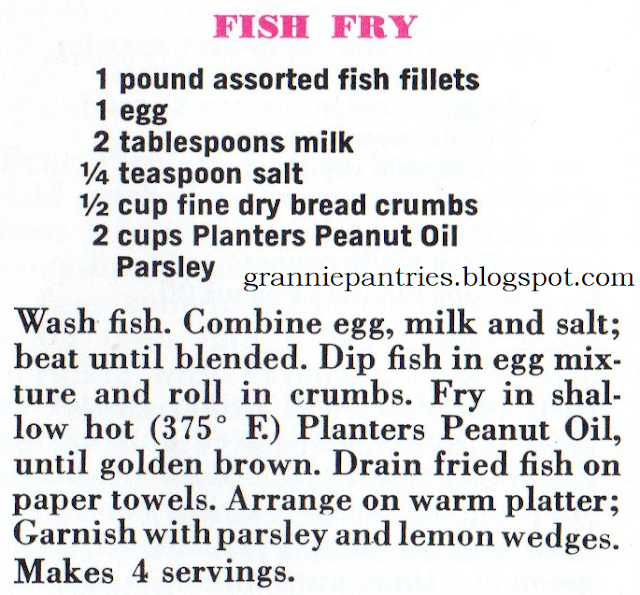Wednesday, October 9, 2019
Peanut Oil Five Ways
There's not a lot that sounds terrible in 5 Great Cuisines with Planters Peanut Oil (undated, but the Shake-a Pudd'n advertised on the back suggests it's from the late 1960s). That's because the book's secret subtitle should be "Aren't deep-fried foods yummy?" The answer from reasonable people everywhere is "Of course!"
The first "great cuisine" is especially known for its love of all things deep fried. Can you guess the cuisine from the picture?
Okay, fried chicken would probably have been a bit more representative of America than fried fish, but anything accompanied by both fries and onion rings says America to me...
I've also got to give the booklet credit for realizing that "french fried" does not necessarily equal French.
The Italian section had the expected scampi, but I was more intrigued by the Italian Potato Balls:
Who can resist potato croquettes? I was just sad that the booklet didn't have their rice-based cousins, arancini. They're not easy to find in my area, but man, I am embarrassingly happy to see those cheesy little rice balls when they're on a menu.
Chinese cuisine is represented with deep fried duckling in front of the stereotypical dried lotus and silver dollar plant:
I must commend the Planters understanding of Chinese cuisine here-- not that I imagine the dish is very authentic, but at least it's not smothered in cream of mushroom soup or hiding under a layer of melted cheese. That's pretty Chinese-authentic for '60s American name-brand cookbooks.
I didn't pick something deep fried to represent Jewish cooking just because I loved the way Planters shoehorned praise for their own peanut oil into a story involving Knaidlach.
Yes, the guy returning home for Passover gets arrested because the authorities suspect him of wanting to overthrow the Czar, as "knaidlach" in the letter is interpreted as code for cannonballs. Don't let your knaidlach turn into cannonballs-- "serve matzo balls of legendary lightness with Planters-- the light cooking oil."
You've got to love Planters just for thinking that was a smooth line.
Finally, we have France. I always think of the New Orleans pastry dusted with powdered sugar when I hear beignets, but Planters presents a savory version for appetizers.
While this choux and cheese concoction sounds like a very French combination, I kind of suspect that the end of the French section was a dumping ground for recipes that wouldn't fit elsewhere in the booklet.
If I saw a recipe for deep fried cauliflower out of context, I would assume it to be an American recipe:
But this is listed in the French section, even though my internet searches suggest Cauliflower Gratin would have been a much more French cauliflower recipe.
Even more egregious, though, is the recipe below it:
Planters, do you realize the Florentine means in the style of Florence, a region in Italy? You even HAD a chapter on Italy where this could have gone. Florence is apparently in France if you ask the peanut farmers, though. You can't trust those goobers.
And since I'm not sure how to end this post, I will treat you to the back cover so you can see the full array of '60s Planters products, including everything from Hunt Club Burgerbits dog food to Siesta decaf to the aforementioned Shake-A Pudd'n. Enjoy!
Subscribe to:
Post Comments (Atom)













While they may have a more enlightened view of Chinese food, they obviously don't know that crossing your chopsticks (like is shown on the cover) is a MAJOR faux pas of Asian cultures.
ReplyDeleteWell, they have to balance things out somehow. You couldn't be TOO aware of other cultures in the 1960s.
DeleteI love it! My FIL's Italian mother switched to using Peanut Oil for its health benefits right around when this cookbook would have come out. This sheds a little light. The potato ball recipe is in our family cookbook but not attributed to Planters. I bet she got it right from them though. It's almost exact. Some other gems here too. Thanks again!
ReplyDeleteIt's funny how so many people suddenly realize an old "family" recipe was originally from the back of the box or a brand's cookbook.
Delete